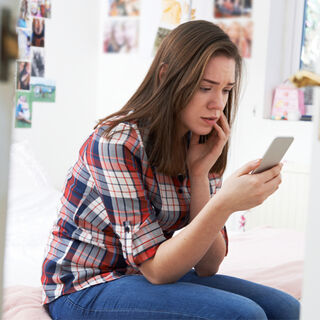Media
Gen Z and the Struggle with Social Media
Now that Gen Zers are aware of the harm it causes, can they overcome it?
Posted March 15, 2022 Reviewed by Hara Estroff Marano
Key points
- Compulsive social media use is rampant among teenagers and college students, and they're now aware how bad it is for their psyche.
- Heavy social media use has been linked with anxiety, depression, low self-esteem, poor sleep, lack of motivation, and poor social skills.
- There's a growing awareness that being more invested in one's online persona than who one is as a person might be a losing proposition.

About 10 years ago, I was teaching at a small university in the Rust Belt but some days didn't feel like I was teaching at all; rather, I was competing for attention, even for two minutes, with everyone's hand-held distraction device. One experience in particular paints a picture: It was a surprisingly sunny and mild day during the otherwise cold and dreary Great Lakes winter. I excitedly announced a 15-minute break in the three-hour seminar for students to go outside and soak it in. Except no one did.
Not one student rose from his or her seat in the small, poorly lit auditorium with no windows and no fresh air. Instead, every single one of them whipped out their phone and got lost in the inner, socially avoidant world of their phones for the duration of the break. Not one student turned to another to chat. There was silence.
That experience depressed me to my core. That same year, my husband (who also worked on campus) and I started noticing how deserted campus seemed—not just on those sub-zero and gloomy mid-winter days but also on those sunny and springlike days later in the semester. Where were the kids tossing a frisbee, playing guitar on the grass like hippies, lying around lazily, soaking up the sun and laughing about something funny that happened in class? Indeed, where was everyone? Where was anyone?
Nostalgic for the 90s
My husband and I graduated from college in the mid-1990s, before the dawn of cell phones. We were fully in touch with our real lives in college and our real friends on campus, and blissfully unaware of how we compared to hoards of people, famous, infamous, or unknown, in other corners of the world. Why would we care? We didn’t know those people anyway.
One of my best friends always was, and still is, titillated by tabloid magazine stories about who’s cheating on whom and then the ugly, dramatic divorces that inevitably follow months later. For some, following the soap opera-esque drama of the rich and famous and the royal family is entertaining. But before cell phones and social media, you had to seek it out—in grocery stores and on TV. The difference now, of course, is that a constant barrage of tabloid garbage is forced down our throats and burned into our retinas.
Social media platforms have successfully converted their subscribers into 24/7 consumers and participants, little tabloid stars unto themselves, posting photos for likes, making snarky comments on posts, willingly signing on over and over again while fully aware this consumption makes people, especially adolescents, anxious, depressed, lonely, lost, confused, desperate, sleep-deprived, and sad. "Social media addiction" is not a recognized clinical diagnosis, but it appears to be an apt descriptive term for what we're observing.
Hope for the future?
Over only the past five years or so, my college students have elected to write about social media addiction, social media "cleanses," and negative effects beyond just anxiety and depression—well-trodden territory by now. There are also advocacy sites for extreme dieting and eating disorders, and the approach-avoidance trap adolescent women find themselves in: the constant comparison of self to others, when, it seems, others always come out on top. There’s the seeming inability to pay attention to anything, the unwillingness to engage socially or date, and more I probably don’t even know about yet.
There seems to be a general growing awareness that being more invested in your online persona than who you are as a person in real life might be a losing proposition. As with any addiction, it’s compassionate to have empathy for the addicts: It happens, it’s unfortunate, and we have a duty to help.
But Gen Zers are no innocent rubes, or unwitting victims of social media corrosion. I feel less compassionate when I have to tell a student to put his phone away for the third time during class when they know my strict no-cell-phones-in-class policy and know it comes with a consequence that affects their grade. As with any compulsion, there are behavioral strategies adults (including college students) can learn, such as leaving the phone in the dorm room, keeping it in one's backpack, turning it on silent, and more.). They know how terrible it is for their psyche, their mood, their self-esteem, etcetera. They're writing essays about it voluntarily! And they need to start acting on that knowledge.
I started teaching college 20 years ago and remember seeing students smoking cigarettes all over campus all the time. Even when I took class outside on a nice day, someone would light up. Now, especially since I teach in Boulder, Colorado—where image-consciousness often passes for health-consciousness—not a single student would be caught dead smoking a cigarette on campus. Not a one. I can’t even imagine it, to be honest. It took a long time to convince people that smoking causes lung cancer, but I think we finally have, and the vast populace has changed its behavior accordingly.
Breaking the cycle
I’d like to see us get to that point with social media. Is it that hard to step away from a huge time-waster that makes you feel terrible about yourself and your life? Shutting down your Facebook account might feel as healthy and empowering as throwing out that last pack of cigs you're never going to smoke anyway.
Middle-aged people like social media to keep in touch with old friends and far-flung extended family. But if they're mature and adjusted adults, they're not at much risk from social media harm. But adolescents, who are just learning and creating who they are as people, will be happier and healthier if they focus on feeling good about who they really are in the real world rather than who they pretend to be online. They know social media is making them sick and it's time to quit.
References
Suggested reading:
Twenge, J. M. (2017). IGen: why today's super-connected kids are growing up less rebellious, more tolerant, less happy-- and completely unprepared for adulthood (and what this means for the rest of us). First Atria books hardcover edition. New York, NY: Atria Books.




